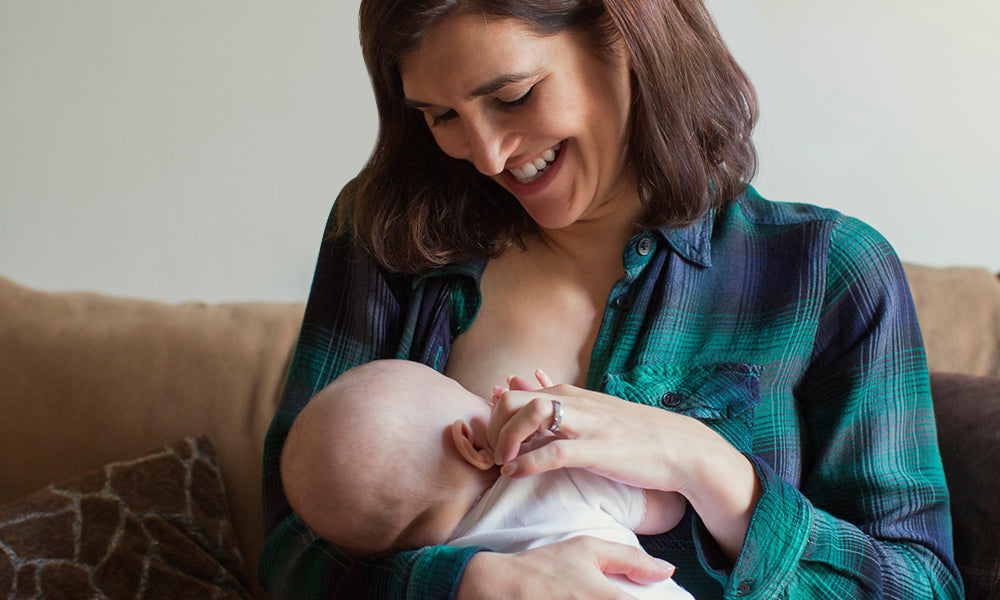Beginner’s Guide To Breastfeeding for New Mums
After nine months of carrying, and hours on end of delivering, your journey as a new mum is just beginning.
One of the first things you will experience as a new mum is the joys of breastfeeding; a wonderful way to bond with your baby and provide them with the perfect amount of nutrition, essential vitamins and minerals required to grow and thrive. Not only will their health benefit from a stronger immune system, but it will help your postpartum, increase recovering time, reduce stress and help form a nurturing bond with your baby.
As a new mum, you will need to overcome a few challenges and obstacles, from latching and positioning to discomfort and nipple soreness. Every mum has a different story to share - each one never being easy.
In this guide, we share our breastfeeding advice for newborn babies so you know exactly what to expect.
What to expect a few days after birth
Colostrum - Your First Milk
Even if it is not showing in your breasts, your body starts producing breast milk around 16 weeks into your pregnancy. This is because your main milk is still yet to Transition
After your baby is born, it's recommended to have immediate skin-to-skin contact until after your first breastfeeding session - which should be an hour after birth. The first milk they receive is called colostrum - a thick, nutrient-dense milk filled with everything they need to thrive during their first 72 hours.
How often should I nurse my baby?
To give your baby all the nutrition they need, and to keep your milk production as healthy as possible, you should try to nurse your baby at least 8-10 times every day. You should feed your baby on demand rather than sticking to a schedule with them.
Remember, the more you nurse, the more milk your body will produce as it keeps up with the needs of your baby. To maintain a healthy milk flow, try to nurse your baby as often as possible.
As they grow, they may require less nursing, but you should continue following their cues and be ready with breastmilk whenever they seem hungry.

How long does it take to produce breast milk after each feeding?
It is a common misconception that you “run-out” of milk after feeding. Your body continues to produce milk rather than store it, therefore there is a constant flow of milk ready for your little one. This means that you will always have milk available regardless of changes in routine
Getting Started
What feeding cues should I look for from my baby?
As a parent, it can be quite tricky to detect signs of hunger in your baby. However, there are several hunger cues you can look out for:
Early Cues
- Rousing
- Looking
- Searching
Later Cues
- Licking lips & routing
- Putting hands into their mouths
- Trying to latch
Latest Cues
- Crying
It is alway beneficial to try and latch on the earliest cues as once the baby is crying it can be more difficult.
During the first few weeks they may not give you the most obvious signs for feeding, so you should aim to feed your baby on demand.
It is natural to misread their signs for something else; as every baby is different, try to avoid feeling down. Over time, you will learn exactly what they want and need straight away.
What should I be eating and drinking?
A healthy and balanced diet is essential for your well-being and your babies health. Some things to achieve this include:
- Maintaining a healthy diet. Make sure to take prenatal vitamins including vitamin D, vitamin C, Iron, calcium and folic acid. As you'll likely be resting around the clock, you may not be receiving as much sunlight as usual; vitamin D supplements are a great way around this and will help your body receive the vitamins it needs.
- Stay hydrated. Breastfeeding can be dehydrating so it can be useful to have a glass of water on-hand for whenever you need it.
- Postnatal and easy-going exercises such as walking and swimming
- Getting as much rest as possible. Even if this means having to rely on close friends or family members to help out, getting enough sleep is crucial.
What bowel movements should I expect?
During the first few weeks of life, your baby will probably have around four to eight bowel movements each day. As your baby grows, these bowel movements will be less frequent, sometimes happening just once a day.
As long as their poo is soft and the nappy is wet with urine, you should not need to worry about constipation.

Common breastfeeding problems many mums face
Throughout your breastfeeding journey, you may encounter many difficulties such as cracked or sore nipples, difficulty with your baby latching, low milk supply, and engorged breasts. These challenges can be overwhelming, but you are not alone.
Difficulty Latching
If you experience difficulties with latching, it can be frustrating and stressful for both you and your baby. Sometimes it can be as simple as changing your breastfeeding position from a cradle hold to a cross-cradle hold. However, it is not always this simple; if you having continuing issues, you can work with a lactation consultant who will help ensure your baby is latching correctly.
Choosing a Lactation Consultant
Lactation consultants are breastfeeding specialists, trained to support you during your journey, helping with common nursing problems such as sore or sensitive nipples, low milk supply, and latching.
Whilst lactation specialists are not essential, they can be a comforting and helpful resource that will provide emotional and physical support, helping you get the most from the breastfeeding experience.
There is no “best time” to choose one - it depends entirely on you. Some mums are pre-emptive and investigate before birth, others might wait until a few weeks after birth and call upon them once they start having issues.
If you do not feel comfortable with a lactation specialist, attending a group breastfeeding class can be a good way to learn tips whilst also sharing the experience with mums in a similar position as you.
Engorgement
Engorgement can be challenging, but frequent breastfeeding will help alleviate discomfort and pressure in your breasts, stopping them from becoming too full. Aside from frequent feeding, you can also express breast milk by hand or breast pump.
If it is painful before breastfeeding, applying a cold compress can help alleviate the swelling. Alternatively, taking a shower with warm water or applying a warm compress can help encourage a consistent milk flow.
You should also wear a comfortable and supportive nursing bra that does not restrict your breasts to alleviate any pain you might be experiencing.
Remember to stay patient and persistent as you navigate through your breastfeeding journey. Many mums have faced and overcome similar challenges, and so can you.
What if breastfeeding is not for me?
Breastfeeding might not be for you, and that is completely okay, whether it is due to physical limitations or personal preference. You should never feel guilty or ashamed for making the decision that is best for you and your baby.
There are plenty of other ways to bond with your little one, like skin-to-skin contact cuddles, playing games that make them giggle, or simply looking into their eyes as you feed them, whether done using infant formula or bottle feeding.
The most important thing is that you and your baby are healthy and happy. There is no outright way to achieve that, so trust your instincts and make decisions that feel right to you.
When is it time to switch from breast to bottle feeding?
Before switching to the bottle, you should wait at least 4 to 6 weeks to allow them time to establish a good latch. Every baby is different, some adapt to the bottle quickly, and others may take a few weeks to adjust to the transition.
If you are looking to start pumping and bottle-feeding, our award-winning hands-free breast pumps allow you to go about your day as comfortably as possible.
When is it time to feed my baby solid foods?
It's recommended to wait until around six months of age before giving solid foods.
Some accurate signs to look for are their ability to sit up unassisted and hold their head steady. The true sign is loosing the tongue thrust reflex which is an indication that baby can safely keep and manoeuvre food in their mouth
Transitioning to solids is a messy process; our specially designed infant weaning sets, baby bibs and silicone tableware are designed to make your life easier, and the journey as manageable and rewarding as possible.















Leave a comment
This site is protected by hCaptcha and the hCaptcha Privacy Policy and Terms of Service apply.